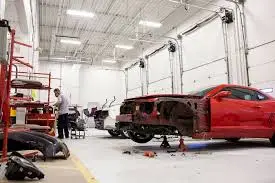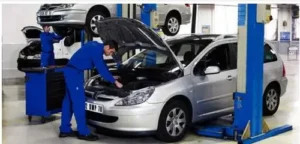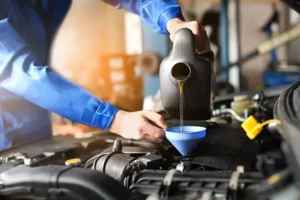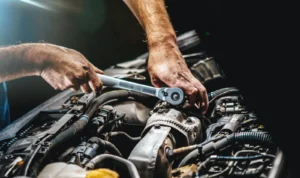As the vibrant fall colors in Cambridge give way to the crisp, cold air, every New England driver knows what’s ahead. The season of nor’easters, icy roads, and freezing mornings is on the horizon. While you might dread the commute on a snowy Mass Pike, your car fears it even more. Winter is the ultimate test of your vehicle’s health, and the engine is its heart. At Mr. Perfect Car Repair in Cambridge, we believe a little preparation can transform a stressful, risky winter season into a manageable one. This comprehensive guide will walk you through exactly how to prep your engine and your car to face a New England winter with confidence.
Why Winter Demands More From Your Car
Before we dive into the “how,” it’s crucial to understand the “why.” Cold weather is brutal on vehicles. Engine oil thickens, making it harder for your engine to turn over and circulate properly. The battery’s chemical reaction slows down, significantly reducing its power output just when you need the most energy to start a cold engine. Components that may have been slightly worn become points of failure under the added stress of freezing temperatures. Preparing your car isn’t just about comfort; it’s a critical safety measure for you, your passengers, and everyone else on the road.
Your Pre-Winter Engine Health Checklist
A few proactive steps can prevent the vast majority of common winter breakdowns. Think of this as your essential pre-winter maintenance ritual.
1. The Critical Battery Check
Your battery is the single most common point of failure when the mercury drops . Cold weather slows down the internal chemical reaction, while at the same time, your engine requires more power to start. A battery that was fine in the summer can fail on the first cold morning.
What to do: Look out for warning signs like the engine turning over more slowly than usual or the battery warning light flickering on your dashboard . At Mr. Perfect Car Repair, we can perform a load test to check your battery’s actual health and its ability to hold a charge under stress. If your battery is more than three years old, a pre-emptive check is a wise investment to avoid being stranded .
2. The Right Oil for the Season
Motor oil is the lifeblood of your engine. When temperatures plunge, oil can thicken into a molasses-like consistency, forcing your engine to work harder and potentially causing premature wear.
What to do: Check your owner’s manual for the manufacturer’s recommended oil viscosity for winter driving. In many cases, a thinner, multi-viscosity oil is better suited for New England’s cold snaps. Our technicians at Mr. Perfect Car Repair can advise you on the perfect oil for your specific vehicle and driving habits, ensuring smooth starts and optimal lubrication all winter long.
3. The Vital Role of Antifreeze/Coolant
Antifreeze does exactly what its name implies: it prevents the water in your engine’s cooling system from freezing. A frozen cooling system can lead to catastrophic engine damage, including cracked blocks or heads.
What to do: Ensure your coolant is topped up and has the correct freezing protection. Coolant should also be changed periodically, typically every 2-5 years, as its protective additives degrade over time . We can test the concentration of your antifreeze at our Cambridge shop to ensure it’s ready to protect your engine from freezing and also from overheating.
4. Don’t Forget the Fuel
It might surprise you, but your fuel tank can be a vulnerability in winter.
What to do: Make it a habit to keep your gas tank at least half full . This minimizes the risk of condensation forming inside the tank, which can lead to frozen fuel lines. A fuller tank also gives you a crucial safety margin if you are ever stuck in traffic during a major storm.
Beyond the Engine: Comprehensive Winter Readiness
While the engine is paramount, other vehicle systems are integral to safe winter operation. A holistic approach to winter prep is key.
- Assess Your Tyres: Your tyres are your only connection to the road. Worn tyres are dangerous year-round, but the risk is magnified on ice and snow. The legal minimum tread depth is 1.6mm, but for winter safety, changing them at 3mm is highly recommended . Consider investing in winter tyres, which are made from a softer rubber compound that provides superior grip in cold conditions .
- Check Your Wiper Blades and Top Up Washer Fluid: Visibility is non-negotiable. Replace worn wiper blades that streak. Critically, fill your washer fluid reservoir with a winter-grade solution that won’t freeze . Never use your wipers to clear an iced-over windshield, as this can tear the rubber blades .
- Inspect Your Brakes: Your brakes need to be in top condition, especially when stopping distances increase on slippery roads. Get them checked if you hear any squealing, feel unusual sensations, or if the vehicle pulls to one side when braking .
- Test All Your Lights: With shorter days and frequent poor weather, your lights are essential for seeing and being seen. Road grime and salt can reduce luminosity by up to 40% . Regularly wipe your headlights, taillights, and brake lights clean, and ensure all bulbs are functioning correctly.
Smart Driving Tips for Cambridge Winters
Even a perfectly prepared car requires a adjusted driving style for winter conditions.
- Clear All Snow and Ice: Before you drive, clear every window, your headlights, your roof, and your hood. Driving with a limited view or with snow flying off your car is dangerous for you and others .
- Slow Down and Increase Following Distance: Posted speed limits are for dry pavement . Drive slower than you think you need to and leave plenty of room between you and the car ahead—it takes significantly longer to stop on snow and ice.
- Beware of Black Ice: This transparent ice layer is most likely to form on bridges, overpasses, and shady spots . If you hit a patch, don’t slam on the brakes. Take your foot off the accelerator and steer straight until your car regains traction.
- Never Use Cruise Control: On any slippery surface, you need full control. Cruise control can be dangerous if you hit a patch of ice and lose traction .
Build Your Winter Emergency Kit
Even with the best preparation, unexpected things happen. An emergency kit in your trunk is your final layer of preparedness.
Your kit should include:
- Ice scraper and de-icer
- Warm clothing, a blanket, and practical footwear
- Torch with extra batteries
- Mobile phone charger
- Snacks and water
- Shovel for snow
- Jumper cables
Your Trusted Winter Partner in Cambridge
Preparing your car for winter can feel daunting, but you don’t have to do it alone. The team at Mr. Perfect Car Repair is here to help. We recommend a Pre-Winter Vehicle Inspection—a thorough check of all the critical systems we’ve discussed. We’ll test your battery, check your fluids, inspect your tyres and brakes, and ensure your charging and starting systems are in peak condition.
Don’t wait for the first snowfall to discover a problem. Visit Mr. Perfect Car Repair at 25 Veterans Way in Cambridge, and let us help you face the New England winter with peace of mind. Schedule your winter check-up with us today.






